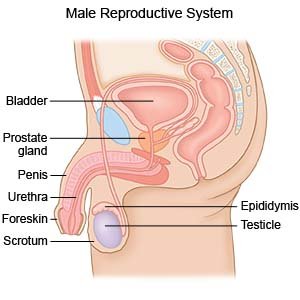Suprapubic Prostatectomy
Medically reviewed by Drugs.com. Last updated on Aug 4, 2025.
WHAT YOU NEED TO KNOW:
Suprapubic prostatectomy is surgery to remove part or all of your prostate gland. Your prostate gland is found below your bladder and surrounds the top of your urethra. Your urethra is a tube that carries urine from your bladder to the outside of your body. You may need suprapubic prostatectomy if you have an enlarged prostate.
 |
HOW TO PREPARE:
The week before your surgery:
- Arrange to have someone drive you home after surgery and stay with you for 24 hours.
- Tell your surgeon about all the medicines you currently take. He or she will tell you if you need to stop any medicine before surgery, and when to stop. He or she will tell you which medicines to take or not take on the day of surgery.
- You may need blood or urine tests before your surgery. You may also need x-rays, a CT scan, or an ultrasound.
The night before your surgery:
You may be told not to eat or drink anything after midnight.
The day of your surgery:
- You or a close family member will be asked to sign a legal document called a consent form. It gives healthcare providers permission to do the procedure or surgery. It also explains the problems that may happen, and your choices. Make sure all your questions are answered before you sign this form.
- Take only the medicines your surgeon told you to take.
- An IV will be put into a vein. You may get medicine or liquids through the IV.
- You may be given general anesthesia to keep you asleep and free from pain during surgery. Anesthesia may be given through your IV. You may instead breathe it in through a mask or a tube placed down your throat. The tube may cause you to have a sore throat when you wake up. You may instead be given spinal or epidural anesthesia to numb the area and dull the pain. You may still feel pressure or pushing during surgery.
- You may need medicines to prevent infection or help prevent blood clots.
WHAT WILL HAPPEN:
What will happen:
Your surgeon will make an incision in your abdomen below your belly button. He or she will remove part or all of your prostate. A suprapubic catheter may be placed into your bladder through the cut in your abdomen to drain your urine. A drain may be placed near your bladder to remove extra blood and fluid. Your surgeon will use stitches or staples to close your incision.
After your surgery:
You will be taken to a room to rest until you are fully awake. You will be monitored closely for any problems. Do not get out of bed until your healthcare provider says it is okay. You will then be able to go home or be taken to your hospital room.
CONTACT YOUR HEALTHCARE PROVIDER IF:
- You cannot make it to your surgery.
- You have a fever.
- You get a cold or the flu.
- You have questions or concerns about your surgery.
Seek Care Immediately if
- You feel the urge to urinate, but no urine comes out.
- You have severe pain in your lower abdomen or back.
Risks
You may bleed more than expected or get an infection. Your bladder, urethra, penis, or nearby tissues may be damaged. Your urethra may become narrow and block the flow of urine. The muscle at the base of your bladder may shorten and cause you to leak urine. Urine may leak inside your body and collect in nearby areas, such as your scrotum. Your kidneys may stop working properly. You may get a blood clot in your leg. This may become life-threatening.
Related medications
Care Agreement
You have the right to help plan your care. Learn about your health condition and how it may be treated. Discuss treatment options with your healthcare providers to decide what care you want to receive. You always have the right to refuse treatment.© Copyright Merative 2025 Information is for End User's use only and may not be sold, redistributed or otherwise used for commercial purposes.
The above information is an educational aid only. It is not intended as medical advice for individual conditions or treatments. Talk to your doctor, nurse or pharmacist before following any medical regimen to see if it is safe and effective for you.
Further information
Always consult your healthcare provider to ensure the information displayed on this page applies to your personal circumstances.
